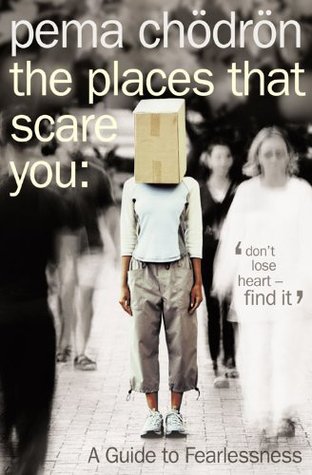More on this book
Community
Kindle Notes & Highlights
by
Pema Chödrön
Started reading
October 31, 2024
Confess your hidden faults. Approach what you find repulsive. Help those you think you cannot help. Anything you are attached to, let it go. Go to places that scare you. – advice from her teacher to the tibetan yogini Machik Labdrön
As my teacher Chögyam Trungpa Rinpoche used to say, ‘Live your life as an experiment.’
When I was about six years old I received the essential bodhichitta teaching from an old woman sitting in the sun. I was walking by her house one day feeling lonely, unloved, and mad, kicking anything I could find. Laughing, she said to me, ‘Little girl, don’t you go letting life harden your heart.’ Right there, I received this pith instruction: we can let the circumstances of our lives harden us so that we become increasingly resentful and afraid, or we can let them soften us and make us kinder and more open to what scares us. We always have this choice.
We will find that tenderness in sorrow and in gratitude. We will find it behind the hardness of rage and in the shakiness of fear. It is available in loneliness as well as in kindness. Many of us prefer practices that will not cause discomfort, yet at the same time we want to be healed. But bodhichitta training doesn’t work that way. A warrior accepts that we can never know what will happen to us next. We can try to control the uncontrollable by looking for security and predictability, always hoping to be comfortable and safe. But the truth is that we can never avoid uncertainty. This not
...more
‘Do I prefer to grow up and relate to life directly, or do I choose to live and die in fear?’
Openness doesn’t come from resisting our fears but from getting to know them well.
‘Always meditate on whatever provokes resentment’
‘How can I practice right now, right on this painful spot, and transform this into the path of awakening?’ On any average day of our lives, we have plenty of opportunities to ask this question.
‘May this person who is driving me crazy enjoy happiness and be free of suffering.’
we are all a paradoxical bundle of rich potential that consists of both neurosis and wisdom.
Shantideva explained it like this: If we wish to practice generosity and a beggar arrives, that’s good news. The beggar gives us an opportunity to learn how to give. Likewise, if we want to practice patience and unconditional loving-kindness and an enemy arrives, we are in luck. Without the ones who irritate us, we never have a chance to practice.
In other traditions demons are expelled externally. But in my tradition demons are accepted with compassion. – machik labdrön
Compassion is not a relationship between the healer and the wounded. It’s a relationship between equals. Only when we know our own darkness well can we be present with the darkness of others. Compassion becomes real when we recognize our shared humanity.
A teacher once told me that if I wanted lasting happiness, the only way to get it was to step out of my cocoon. When I asked her how to bring happiness to others, she said, ‘Same instruction.’


